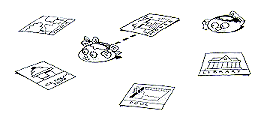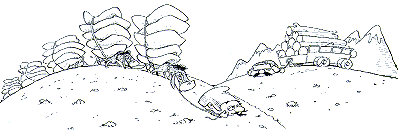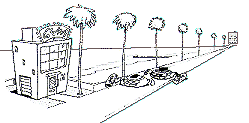
|
Feedback Form

ROAMER, TURTLE AND MEASUREMENT 3
 The
last two Issues of GO started to look at measurement. "Units are arbitrary.
No particular magic lies in units like centimetres, kilograms or litres.
These are adult conventions." GO takes a closer look at this key idea.
The
last two Issues of GO started to look at measurement. "Units are arbitrary.
No particular magic lies in units like centimetres, kilograms or litres.
These are adult conventions." GO takes a closer look at this key idea.
Measurement is the comparison of one thing with another. A child's first interest in size arises through contrast: larger or smaller, lighter or heavier, more or less.

• What Units?
It was a hot summer's day. Mary Roamer wanted to go to the library.
"It's quiet and cool there," she said. Malcolm wanted to go swimming.
"A swim would cool us down," he remarked. Margaret suggested going the
park and sitting by the pond. Martin said, "Let's go to the shop and get
some ice cream - that will really make us cool down." The problem was
they couldn't agree on which place was the nearest to their home.
Draw pictures on large sheets of paper to represent the house, pool, park, shop and library. Place them on the floor in different places. Program the Roamer to travel from the house to one of the places. Carry the Roamer back home: do not clear the memory. The program in the Roamer now represents the basic unit of measurement. Use it to measure the distance between home and the other places. Which is the closest? Which is farthest away? Compare the distance between the library and the park, the park and the swimming pool, etc. Was the unit of measure chosen a good choice? How could it be improved?

• Standard Units
Homer the Roamer set off on the long journey from Phoros to Faras for
Barter Day. This was the day Roamers from every corner of Roamerworld
got together and swapped goods. Homer took with him a train of 5 mules
each carrying 5 bales of silk. Phoros need new houses so Sylvia, the mayoress,
had instructed Homer to swap the silk for timber. Briony Roamer came from
the forests of Beras with 112 lumjacks of wood. Their problem was that
bales and lumjacks are different units of measurement. There was a lot
of discussion before Homer and Briony could agree on a trade.
Ask the children to write a play based on the above story. Design Roamer characters to represent Homer and Briony. Use the Roamer's unit setting facility to give the two characters different basic units of movement. These units represent one bale and one lumjack. Program the characters to act out the storyline. Homer can measure out a length of silk and Briony can measure a length of wood.
Compare these lengths.
Discuss the problems the merchants had in agreeing a trade. Would standard
units have been useful?
Discuss the need for standard units.
Standardisation of units is important because it allows people to talk
to each other about measurements. The standard measurements mean the same
thing to everyone. Organisations like ISO, BSI, DIN, etc. spend a lot
of time developing standard measurements.
ISO - International Organisation for
Standardisation
BSI - British Standards Institution
DIN - Deutsche Industrie-Norm
• Different Units
The distance between stars is measured in light years. The distance between
towns is measured in kilometres, the distance across a room in metres,
and so on. The unit used will depend upon the relative size of what's
being measured. Generally the unit will avoid using large numbers or fractions.
 A 4 kilometres long
straight road went from where Jazz and Jump Roamer lived to the gymnasium.
They went there as often as possible because both liked aerobics. The
entrance to the gym was set back from the road by about 4 metres. Program
the Roamer to travel to the gym.
A 4 kilometres long
straight road went from where Jazz and Jump Roamer lived to the gymnasium.
They went there as often as possible because both liked aerobics. The
entrance to the gym was set back from the road by about 4 metres. Program
the Roamer to travel to the gym.
This activity needs careful preparation. Create the environment in the story. Make the distance between the house and the gymnasium 4 large units. Set the distance from the road to be 4, much smaller, units. (Four small units must be less than one large unit). Set Roamer's units of distance to match the large units. Ask the children to program the Roamer to travel from the house to the gym. With Roamer using the large units this will not be possible. Discuss the results. What is needed to be able to solve the problem?
| Back |
|---|